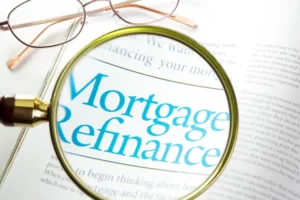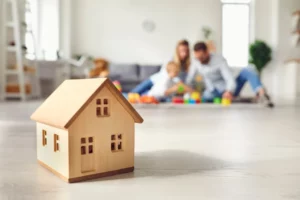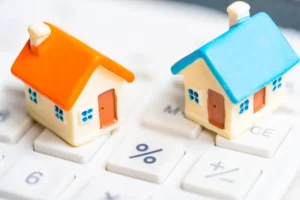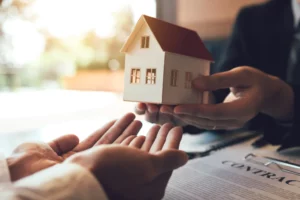A Reverse Mortgage is a mortgage product secured by a principle residence enabling the homeowner to access the equity of the home and not make traditional mortgage payments on the loan. 93% of Canadians want to age in place, in the home they love.
Access to traditional lending becomes limited for seniors, as the income isn’t always there to support the lender guidelines. With a Reverse Mortgage the interest is added to the Reverse Mortgage loan. The home is essentially paying the homeowner back for the years they had been paying their mortgage balance down.

In Canada, the Reverse Mortgage follows very conservative lending guidelines, the borrower must be at least 55 years of age, the maximum borrowing amount is 55% of the appraised value of the property. And it must be the borrower’s principle residence, either a single family home or a condo. If you own a home as opposed to a condo you will get more equity from the home.
Borrowers are responsible for the property taxes, homeowner’s insurance and maintain the property condition. Currently, there are 2 lenders in Canada who provide a Reverse Mortgage product. HomEquity Bank also known as CHIP Reverse Mortgage, and Equitable Bank. Both lenders are Schedule A chartered banks. Access to these lenders is through a Certified Reverse Mortgage Specialist who provides expert advice through the entire process.
A Reverse Mortgage is a niche product. It is a great product for the right borrower, generally the older you are and the higher value of your property is going to give you more equity. If the borrower is only 55 and does not have much equity in the home, this isn’t the right product for them at this time.
There are a few different mortgage options available to suit every borrower’s needs under the Reverse Mortgage product line up. Each borrower’s goals are discussed and the right product is tailored with those goals in mind.
A Reverse Mortgage is a great alternative to a home line of credit for a few reasons.
- Firstly, a home line of credit requires the minimum monthly interest payment.
- And secondly, the home line of credit is a demand loan, if one spouse passes away, the bank can call the line of credit in to be paid immediately. This does not happen with a Reverse Mortgage, they will not call for repayment if one spouse passes away.
- It is also important to mention that the title always remains in the borrower’s names, the lender does not take title of your home.
- The interest rates of the Reverse Mortgage are good rates considering you do not have to make a payment.
- The rates are better than second mortgage interest rates, but not as low as a regular mortgage secured by the traditional lending guidelines.
- You do have the option of choosing a fixed rate or a variable rate as well. And the terms range from 1- 5 years.
- An Open mortgage option is available as well if short term financing in necessary.
- Many people wonder if they will lose all of their equity when the sell their home and repay the reverse mortgage. Because of the conservative lending maximum at 55% this will never happen. Property values increase at a moderate 7-10% increase per year and the interest rate is calculated at half that amount the home will always have equity remaining. The value is increasing more than the interest is costing you.
- The purpose of a Reverse Mortgage is to allow seniors to live comfortably in retirement. HomEquity also provides a No Negative Equity Guarantee, as long as the borrower follows the terms of the mortgage.
There are many reasons why Canadians are utilizing the benefits of a Reverse Mortgage, here are a few to get you thinking how could financial freedom could feel.
- Take care of personal finances by accessing equity to pay off debts, improve cash flow without touching your investments.
- Or maybe it’s time to pursue your passions and interests with a vacation home, or go back to school, or indulge in your prized hobby.
- Borrowers also use a Reverse Mortgage for early inheritance to family members to purchase a home, or provide tuition fees to grandchildren.
- Maybe you need to renovate your home instead of incurring the cost of downsizing into a new place, or accommodate home care so you remain in your home as you age.
- You can also supplement your income with a monthly deposit into your bank account keeping your current standard of living.
Your reasons may be different and that’s okay, how you choose to spend your money is up to you. The cost of getting a Reverse Mortgage is similar to a regular mortgage. There is an appraisal cost and the cost of the lawyer to complete the documentation and Independent Legal Advice. A good guestimate would be around $2400.00.
A Reverse Mortgage can refinance an existing mortgage and other outstanding debt, and a Reverse Mortgage can also be used for a new purchase. Your sale proceeds will provide the down payment and the Reverse Mortgage will make up the remainder of the new purchase price.
Remember, you don’t make any payments on this mortgage. As long as you can show some income to cover the insurance costs and the property taxes, most seniors are eligible for a Reverse Mortgage product if the meet the guidelines.
As you can see a Reverse Mortgage can be good or bad for the right or wrong reasons. The pros and cons are specific and unique to each individual applicant.
The design of a Reverse Mortgage helps seniors in retirement in a variety of ways, reducing financial stress and creating opportunities to maintain current living standards is the focus. The funds accessed from your Reverse Mortgage are tax free and do not impact your current pension income or government supplemental income.
This article may have you asking Why not consider a Reverse Mortgage? And maybe it is time that your home started paying you back! If you are wanting more information please contact me for a FREE consultation with no obligation. Lets get you started today loving your retirement with no financial stress.
Reverse Mortgage Explained
For more reverse mortgage information, refer to the following articles that shed more light into this unique mortgage product.
Reverse Mortgage Pros And Cons
A reverse mortgage is basically for seniors starting from the age of 55 years up. Over the years a reverse mortgage as a product gained bad reputation due to being misunderstood. A lot of myths and conceptions grew around it despite the many advantages and benefits it brings to our seniors.
Isn’t It Time Your Home Started Paying You Back?
A Reverse Mortgage is a mortgage product secured by a principle residence enabling the homeowner to access the equity of the home and not make traditional mortgage payments on the loan. 93% of Canadians want to age in place, in the home they love.
What a No Payment Mortgage Can Do for You
With more seniors retiring each year with debt, a Reverse Mortgage is becoming a popular solution for retirees. And it doesn’t stop here. If you are 55 years of age, with a principle property you can access the equity in your home and turn it into tax free money.
Helping Canadians Age in Place with a REVERSE Mortgage
Did you know 39% of Canadians or 44% of households are over the age of 55 and is the fastest growing demographic in Canada? There has never been a better time to get acquainted with the advantages of a Reverse Mortgage for your financing solutions.
Reverse Mortgage Questions
The following frequently asked questions about reverse mortgage facts will also help answer some of your unanswered questions.
What happens when you sell your home with a reverse mortgage?
When you sell your home with a reverse mortgage the title company will send the required payoff amount to your reverse mortgage lender once your house has sold. Ascertain that the reverse mortgage loan is fully paid off with the proceeds and that your lender account is closed. Any extra money will be given to you.
Who is not eligible for a reverse mortgage?
You are not eligible for a reverse mortgage if you do not meet the minimum age requirement of 55 years of age, and if you do not own your principle residence with a fair amount of equity in it you will not be eligible for reverse mortgage. It doesn’t mean you won’t ever be eligible just means at this current time you are not eligible.
Are reverse mortgages transferable?
Reverse mortgages are not transferable and it usually belongs to one person or two married spouses. If one spouse dies but the surviving spouse is identified as a co-borrower on the reverse mortgage, the surviving spouse will stay in the house and the loan terms remain unchanged. Adult children and other nonspouse descendants, on the other hand, must pay off the debt when the last borrower dies. They have the option of keeping the house or selling it.
Can you get a reverse mortgage on a condo in Canada?
Another factor is the location of the property the type of dwelling on the property and the overall marketability of the property. So let’s start with the location of the property. The location of the property must be in an urban centre, it cannot be a rural property or an agricultural zoned property. It must be the applicants’ owner occupied principle residence and this can either be a single family home, an apartment style condo, a high rise condo or a town home.
What happens at end of reverse mortgage?
At the end of a reverse mortgage, the loan must be repaid when the last surviving borrower passes away. Most of heirs will sell the house to pay back the loan. The heirs will not have to pay more than 95% of the appraised value if the loan balance exceeds the value of your home.
Can a family member be added to a reverse mortgage?
Other family members such as your children even though they may be adults they are not eligible to apply for a reverse mortgage or be on title of your reverse mortgage if they do not meet the minimum age requirement of 55. If you happen to pass away and your property has a Reverse Mortgage on it and you have left your property to other family members, they will not be able to assume the Reverse Mortgage as they will not meet the required criteria at this time.
Can you lose your home with a reverse mortgage?
It is almost impossible to lose your home with a reverse mortgage since you borrow against your home’s equity and repay the loan with the proceeds of the sale. There aren’t many ways to lose ownership of a reverse mortgage because you still own your house, unless you fail to preserve three primary components of your home’s legal status.
Are there Closing Costs on a Reverse Mortgage?
Yes, there are closing costs on a reverse mortgage just like there are closing costs on a traditional mortgage or on a line of credit. The reason for this is the lender requires the borrower to have independent legal advice also known as ILA for their benefit and protection. This cost can vary depending on your location and the lawyer you choose, and the fee is approximately $500-$1000.
Who is eligible for a Reverse Mortgage?
You are eligible for a Reverse Mortgage in Canada if you are a Canadian homeowner and at least 55 years old. If you have a spouse, the spouse must also be 55 years or older to be eligible to become a co-borrower. However, more parameters are considered in order to qualify.
What Happens if I Die with a Reverse Mortgage?
With a traditional mortgage, either the home is sold and the outstanding mortgage balance is paid off with the sale proceeds or the home is left to the estate and it is dealt with there. The same goes for a Reverse Mortgage. If you pass away with a Reverse Mortgage the home is sold and the Reverse Mortgage is paid out from the sale proceeds.
If you would like more information or a free consultation to see if a Reverse Mortgage is a fit for you, you can contact me below, and as a Certified Reverse Mortgage Specialist I would be more than happy to review your financing options with you and provide you with Expert Advice to Guide You Home.






